-
Start-to-Finish Ownership
Ownership is one of our key criteria when evaluating performance.
Everyone in Instacart’s engineering organization is expected to take ownership of their work – regardless of where you or your team members physically work from (thanks to our new office, flex, remote policy). Ownership covers all of the ingredients – how you scope, plan, ship, communicate cross-functionally, and maintain your work. We value ownership so much that it is one of the main categories by which individual contributors and engineering managers assess performance.
We value engineers who can truly “own” their projects and communicate with design, product, comms, and other adjacent teams. As the company grows, it becomes increasingly important for individuals to possess both the EQ and IQ to manage a project from beginning to end. Ownership grows as you grow within the company, too. Over time, engineers take on bigger projects that range across their team, the engineering org, or even the whole company.
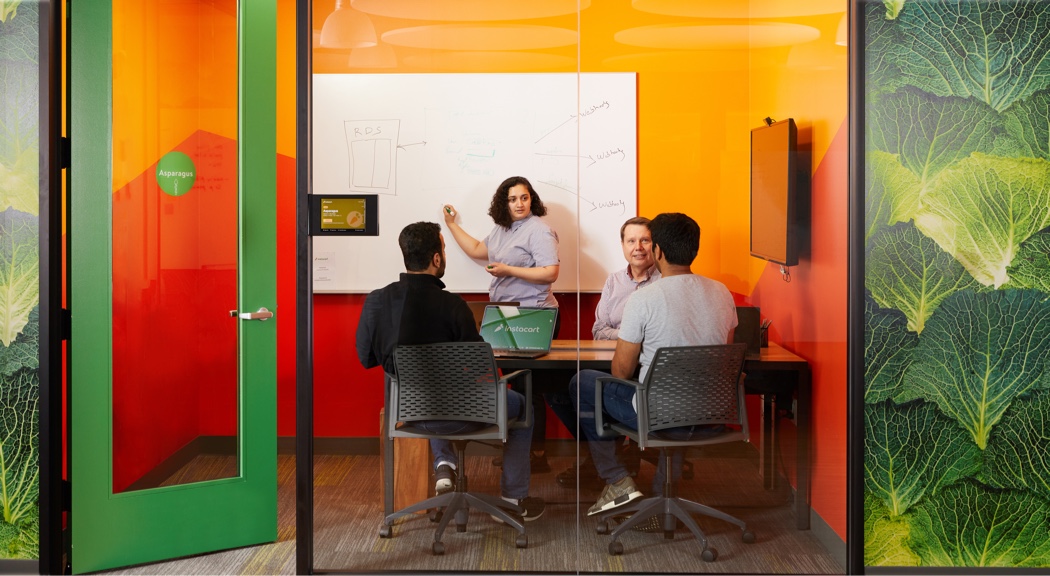
-
Wears Many Hats
We love generalists.
If you’re not an expert in one particular language, that is completely fine! We love engineers who are generalists and have experience with (or interest in) multiple languages and platforms. Be endlessly curious!
While there are tons of opportunities for those interested in depth, there are just as many for those looking for breadth. Instacart is a four-sided marketplace that connects customers, shoppers, retailers, and brands. As a result, there are many opportunities to explore the intersections between our end users. We have unique and complex problems to solve because we focus on how consumer, advertising, ecommerce, and enterprise products interact with one another.
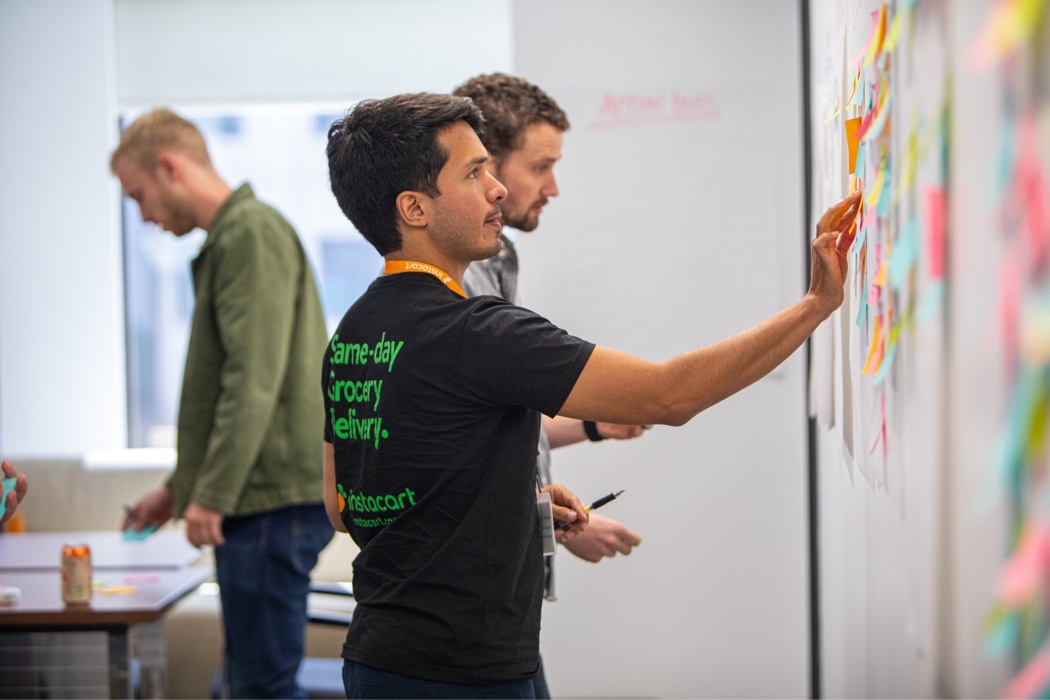
-
Cutting-Edge Technologies
We maintain a complex, interdependent chain of technology.
We don’t just aim to build a great marketplace for customers and shoppers. We are also trusted by many of the top retailers in North America to power their ecommerce businesses, something that’s so important to this industry as transactions move online. With our marketplace as well as enterprise offerings, we build the technological forefront of our retailers.
We’ve doubled down on machine learning and data science in order to maintain a massive data catalog (the largest grocery catalog ever), mitigate lost demand in our fulfillment chain, and build the technological backend of our retail partners’ white-label sites (if you made an online purchase from Costco.com, it was powered by Instacart). Check out this deep dive on the algorithms we use to power Instacart.
Our backend systems support tight integrations with some of the largest retailers in North America and our engineers are working to scale operations across our iOS, Android, and web applications. We currently use Rails, Ruby, Python, R, PostgreSQL 9.6, React 0.17, AWS, Docker, RabbitMQ, Sidekiq, Snowflake, PostgreSQL, Stripe, Twilio, Mapbox, and SiftScience, but don’t require folks to have experience with our stack. There is no shortage of interesting models to improve, algorithms to optimize, and problems to solve as we reach scale. If you have a solid sense for basic languages and are eager to learn new ones, please reach out!
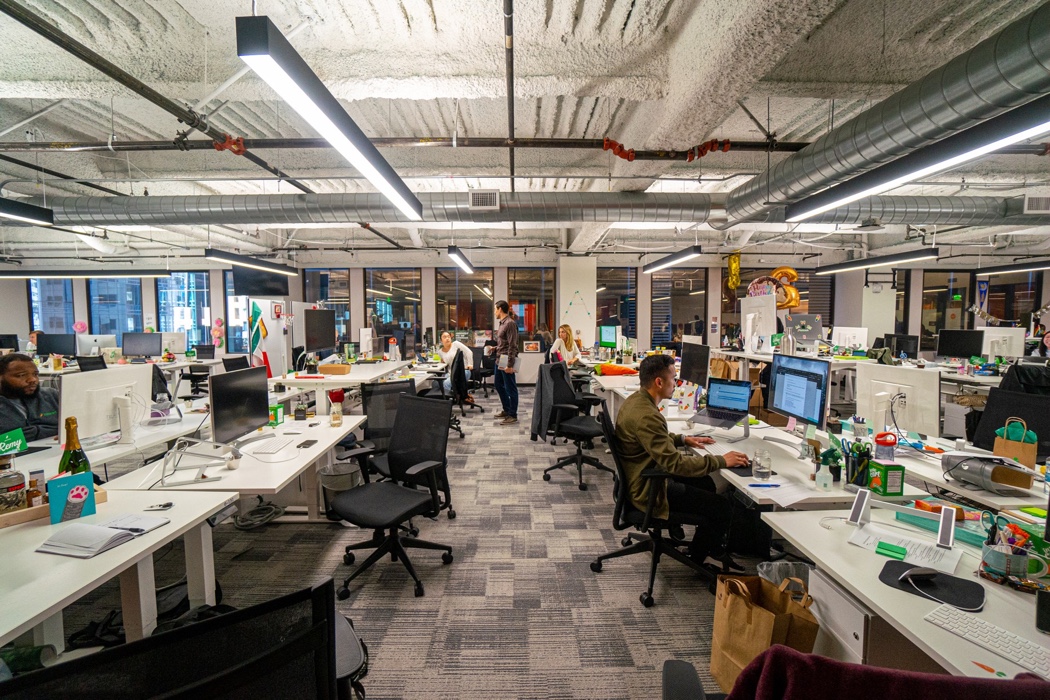
-
Fast-Paced Environment
Our business has dramatically transformed these last few years.
As shelter in place orders rolled out across North America in 2020, Instacart became an essential service and lifeline for consumers across the U.S. and Canada overnight. As expected, we sprung into action to maintain our systems to keep up with demand. Today, our business has a new resting heart rate that's 4x where we were at the start of 2020 thanks to the fast thinking and adaptability of our technical teams.
Grocery is one of the most logistically complicated industries out there, while retail as a whole is changing at a fast clip. We succeed because we’re constantly building, iterating, and testing.
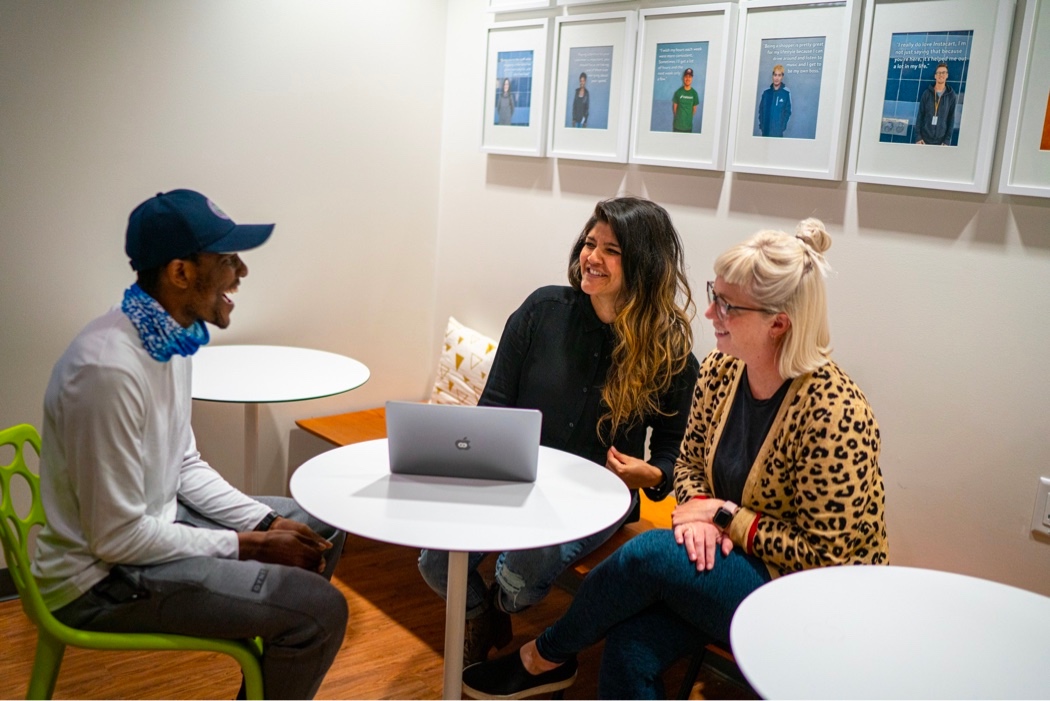
-
Open Communication
We are so much more than code, pipelines, models, and metrics.
You can be one of the best engineers in the world, but the impact of your work depends on how well you communicate and work with your team. Instacart has many moving parts, making whole ownership, as mentioned previously, so important to success. To facilitate cross-functional collaboration, we host regular “Hackers Lunch” meetings where engineers share their recent work and keep others informed of what projects are important to them. In the past, people have presented on topics like The New PagerDuty, Efficient Services, Technical Writing for Fun and Profit, and Building Availability Models.
At a company-wide level, we meet on a monthly basis for our All-Hands where leaders share updates on projects, launches, and larger announcements. Our CEO also hosts a weekly AMA series, where she answers questions that are top of mind for employees. And our employee-led Employee Resource Groups hold regular internal discussions about topics of interest.
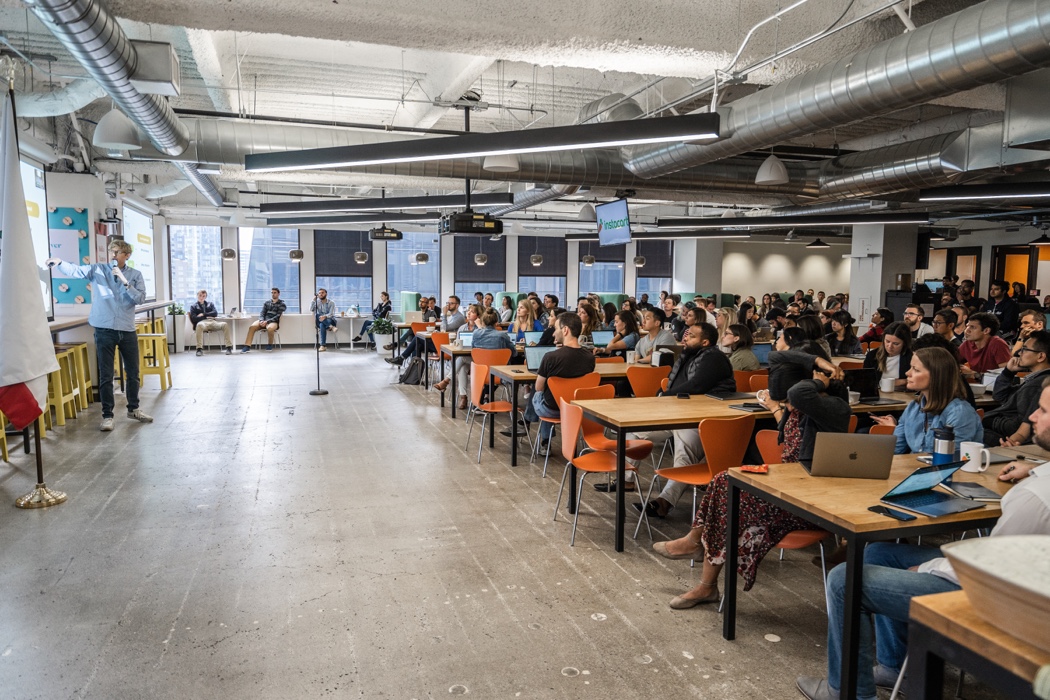
-
Engages with Community
We believe community extends both inside and outside the walls of Instacart.
From an engineering perspective, we love talking about what we’re working on with the greater engineering community. We share best practices at our SF HQ and our Toronto engineering hubs; host popular podcasts (Kaushik Gopal, Senior Staff Engineer, is the co-host of the Android podcast, Fragmented); demo and speak at conferences (Lesbians Who Tech, Pycon, DroidCon, ElastiCon, Collision); and regularly contribute to open source projects (Coil, Lore, Jardin, TrueTime, Arn, and more). With grocery as core to our business and, well, everyone, we encourage all employees to stay involved in the greater community around them, like neighborhood food banks and organizations addressing pressing issues like food insecurity.
Our Social Impact Program “Instacart Serves” aims to nourish its communities by helping to remove barriers to food access and enriching the lives of our communities through an annual volunteer week of service, grocery donations, disaster relief, and giving campaigns. Since the start of the pandemic, we’ve donated over 7 million meals to communities disproportionately affected by food insecurity and natural disasters. We’ve also created new partnerships with nonprofits like No Kid Hungry, Feeding America, and the Boys and Girls of Club of America to make grocery delivery more accessible and affordable for all.
Instacart Serves currently focuses its support across three main areas:
- Food Insecurity. The majority of our philanthropic support is dedicated to helping to remove barriers to food access and hunger relief with our primary giving partner, Feeding America. We also recognize that food insecurity disproportionately affects diverse communities and work to also raise awareness for this growing inequity.
- Supporting Traditionally Marginalized Communities. We are committed to actionable change and standing up for injustice and equity, and support organizations that challenge economic injustice and work to uplift traditionally marginalized communities.
- Disaster Relief. In the event of natural disasters which severely impact the communities in which our customers, employees, and shoppers work and live, we provide disaster relief through financial or grocery donations to centers and organizations which support evacuees and first responders.
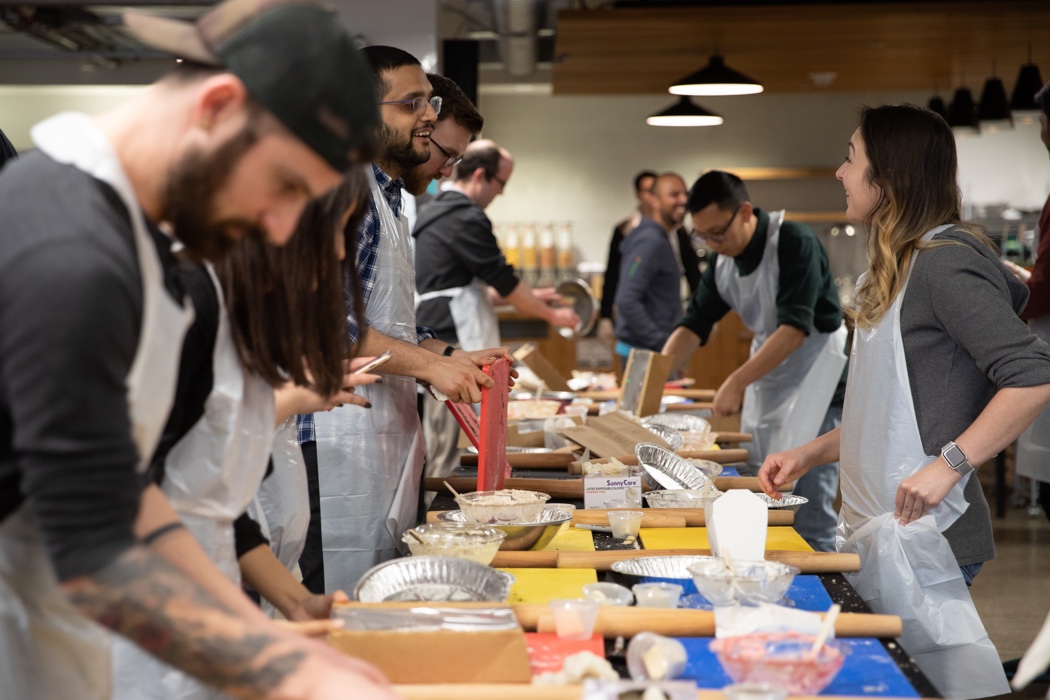
-
Cross-Department Collaboration
As a four-sided marketplace, cross-functional collaboration is critical to our success.
We serve four key stakeholders:
- consumers using our app to order groceries,
- shoppers who are in-store and fulfilling grocery orders,
- brick and mortar retailers on our platform, and
- consumer packaged goods (CPG) brands who serve ads in our consumer app.
Internally, we’re organized in four key groups to serve each of our stakeholders. Our four-sided marketplace means we effectively build four interrelated, but separated products, each with their own focus, challenges, and opportunities. Each technical team is composed of mobile and full-stack engineers, data scientists, ML engineers, and infrastructure engineers. We work together to build our mobile and web apps, B2B software, fulfillment chain technologies, and advertising networks. Given how dynamic our four-sided marketplace is, engineers regularly work with product designers, product managers, finance, marketing, communications, and many other teams to scope projects, prepare for scale, and launch new features.

-
Data-Driven
Instacart is a data-driven organization.
We build and test often, and use as much data as we can gather to inform new features for our customers and shoppers. Our data science team in partnership with our product team develops hundreds of experiments per quarter to improve the customer, shopper, retailer, and advertiser experiences across our product portfolio.
If you’re interested in learning more, we’d love to hear from you!